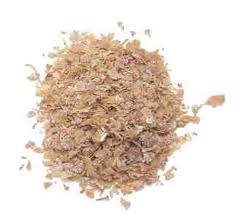 Bran is the hard outer layer of cereal grains which consists of the aleurone and pericarp of the grain. For this reason, bran is often considered a by-product of the milling process. Since this is the byproduct of the milling process, bran can be produced from a number of crops. Namely, rice, corn, wheat, oats, barley and millet. Rich in dietary fiber and essential fatty acids, bran also contains a high percentage of vitamins and minerals.
Bran is the hard outer layer of cereal grains which consists of the aleurone and pericarp of the grain. For this reason, bran is often considered a by-product of the milling process. Since this is the byproduct of the milling process, bran can be produced from a number of crops. Namely, rice, corn, wheat, oats, barley and millet. Rich in dietary fiber and essential fatty acids, bran also contains a high percentage of vitamins and minerals.
Key Nutrients
Bran provide a healthy source of fiber, and especially B vitamins. Bran is also low in saturated and unsaturated fat content.
Health Benefits
Vitamin B1 – Thiamine is an important vitamin since it breaks down sugars in the body. Thiamine also helps to support nerve and heart health.
Vitamin B6 – Vitamin B6 helps to keep your immune system in good working order. It aids in the breakdown of fats, carbohydrates and amino acids while helping to maintain the health of lymph nodes. Additionally, vitamin B6 helps to regulate blood glucose levels.
Vitamin B9 – Folate is an important vitamin for liver function.
Vitamin B12 – Vitamin B12, or folic acid, helps to preserve neurological function and DNA synthesis. It also plays a key role in the health of red blood cells. The nervous system relies on vitamin B12 for proper function as well.
Dietary Fiber – Dietary Fiber stimulates digestion and peristalsis, helping to relieve indigestion and constipation problems.
Season
Since they store indefinitely, you can find bran year round in your supermarket.
Nutrition Information
Per ½ cup (20 grams):
Calories (cKal): 64
Protein (grams): 1.88
Total Fat (grams): .44
Carbohydrates (grams): 16.08
Fiber (grams): 3.5
Buying and Storing
There are no real issues to consider when buying bran besides making sure you are comfortable with the source and brand. They store for a very long time, just make sure to keep in a sealed container, and store for up to one year.
BranRecipe

 Not Sure What Healthy Foods To Eat?
Not Sure What Healthy Foods To Eat? This week we take a look at one of my favorite healthy foods...the mighty Avocado.
This week we take a look at one of my favorite healthy foods...the mighty Avocado.
No comments yet.